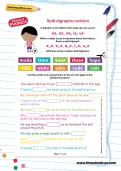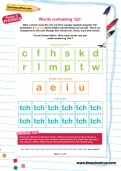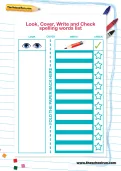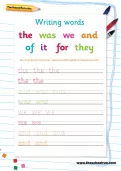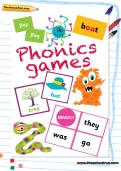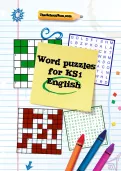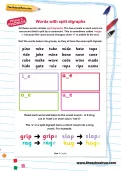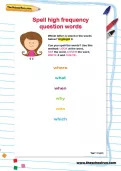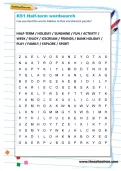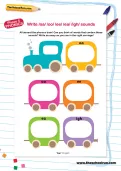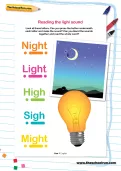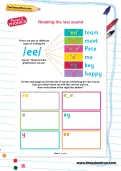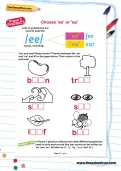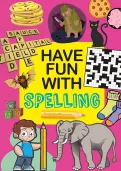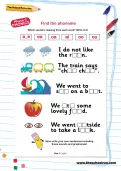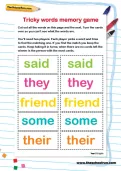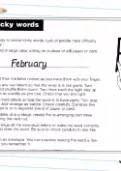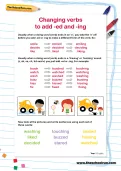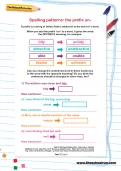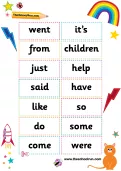Roll the die and see how many words you can think of that start with that sound.
or
Register to add to your saved resources
Boost handwriting and spelling skills with this worksheet. The focus is on some of the high-frequency words your child will learn to read, spell and write in Reception and Year 1; letter formation guides and dotted line versions are provided to help them practise.
or
Register to add to your saved resources
Your child will do lots of phonics learning at school – so why not use games to help them put their new skills into practice at home? Our Phonics games learning pack, created by a KS1 teacher (and parent), offers ten games and activities to choose from. Everything you need to start playing, from instructions to game boards and a sound die, is included in your download – print off your bingo counters, sharpen your pencils and have some fun!
or
Register to add to your saved resources
Already a subscriber? to view this content.
Take a break from homework and spelling drills with this collection of word puzzles for Key Stage 1! Each one covers a different concept that your child will learn in English lessons, but presents it as something to solve by remembering what they've been taught in class.
or
Register to add to your saved resources
Already a subscriber? to view this content.
Help your child understand split digraphs (the magic 'e' rule) by having them group similar split digraphs into the correct categories on this worksheet.
or
Register to add to your saved resources
Already a subscriber? to view this content.
Help your child practise spelling these high-frequency question words.
or
Register to add to your saved resources
Already a subscriber? to view this content.
Use this wordsearch during half-term to help your child with vocabulary and spelling while recognising words that are all about having fun!
or
Register to add to your saved resources
Choo choo! All aboard the phonics train! Check how much your child has learned with this revision worksheet for Year 1. I wonder how many words they can think of?
or
Register to add to your saved resources
Already a subscriber? to view this content.
Does the igh sound make you sigh in the night? This worksheet will help you see the light! Practice with all your might and you will soon be soaring high!
or
Register to add to your saved resources
Already a subscriber? to view this content.
This activity will enable your child to recognise the /ea/ sound, which can be represented by a number of different graphemes, and practise reading and writing it.
or
Register to add to your saved resources
Sometimes the same sound can be written in different ways. This sheet enables children to choose when to use the grapheme 'ee' and when to use the grapheme 'ea' to represent the sound /ee/, as part of a colouring activity
or
Register to add to your saved resources
Already a subscriber? to view this content.
Does your child’s spelling really let their writing down? Have fun with spelling offers you practical and effective strategies to help support your child’s learning at home, based on a real understanding of how spelling is taught and why it’s tricky to master. The bad news? Your child will be beating you at Scrabble before you know it!
or
Register to add to your saved resources
Already a subscriber? to view this content.
A Phase 5 phonics worksheet to help children understand how to use the correct phoneme / grapheme.
or
Register to add to your saved resources
Already a subscriber? to view this content.
This worksheet encourages children to look at the shape of words to help them with their spelling.
or
Register to add to your saved resources
Already a subscriber? to view this content.
This worksheet consists of singular and plural names of animals that children need to match up.
or
Register to add to your saved resources
Already a subscriber? to view this content.
Use this memory game to help your child to remember the spellings of some tricky high frequency words.
or
Register to add to your saved resources
Already a subscriber? to view this content.
This worksheet gives ideas on how to help your child learn the word 'February'. The same activity could be applied to various other difficult words.
or
Register to add to your saved resources
Already a subscriber? to view this content.
This worksheet explains the rules for changing the tense of verbs ending in 'e' and also those that end in 'hissing' and 'buzzing' sounds.
or
Register to add to your saved resources
Already a subscriber? to view this content.
A prefix is a string of letters that is added on to the start of a word. When you add the prefix ‘un-’ to a word, it gives the word the opposite meaning. Can you use this rule to change the meaning of words in these sentences?
or
Register to add to your saved resources
Already a subscriber? to view this content.
During Years 1 and 2 your child will be expected to learn to read and spell high-frequency words as well as the days of the week, months of the year, numbers to twenty and colours. Help them practise at home with our colourful flashcards.
or
Register to add to your saved resources
